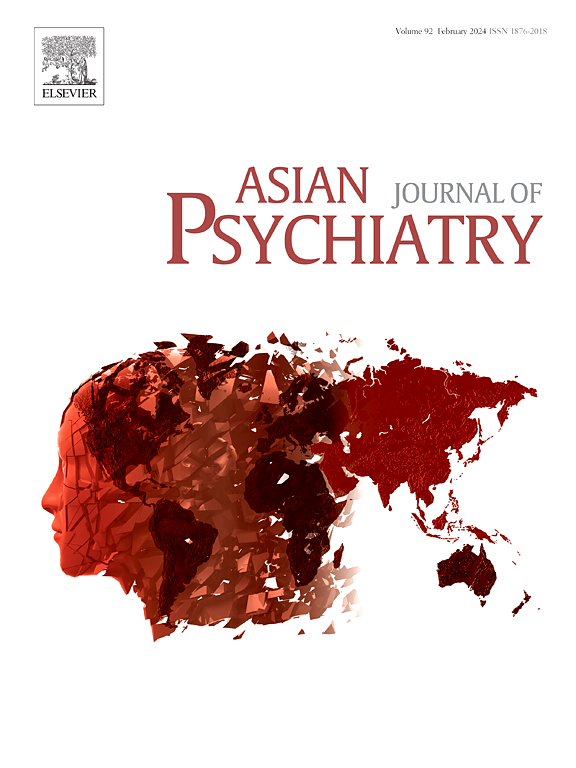Measuring ICD-11 dissociative identity disorder: Cross-cultural validation of the international dissociative identity disorder questionnaire
IF 4.5
4区 医学
Q1 PSYCHIATRY
引用次数: 0
Abstract
Recently, the ICD-11 has updated the diagnostic requirements for dissociative identity disorder (DID) and introduced partial DID as a new diagnosis. This study validated the first measure of DID and partial DID as defined in ICD-11. Two convenience samples of mental health service users (118 Chinese speakers and 115 English speakers) completed the International Dissociative Identity Disorder Questionnaire (IDIDQ), the Dissociative Experiences Scale-Taxon (DES-T), and the Multiscale Dissociation Inventory (MDI) in their respective language. The IDIDQ had good to excellent internal consistency (α =.861 to.892) and test-retest reliability (ICC =.682 to.854, p < .001) in both samples. The 3-factor structure of DID (i.e., amnesia, dissociative identities, and switching), as proposed in ICD-11, was supported by our cross-cultural data, with configural, metric and scalar invariance established across the Chinese- and English-speaking samples. The IDIDQ reliably detected probable ICD-11 DID and partial DID (κ =.517 to.781, p < .001) during a one-week test-retest period. The IDIDQ subscales were strongly correlated with the respective MDI subscales and the DES-T scores. The IDIDQ results had moderate to substantial agreement with the MDI Identity Dissociation subscale and the DES-T in both samples (κ =.514 to.741, p < .001). This study provides first evidence showing the ICD-11 DID and partial DID can be reliably and validly measured using the IDIDQ.
测量ICD-11分离性身份障碍:国际分离性身份障碍问卷的跨文化验证
最近,ICD-11更新了分离性身份识别障碍(DID)的诊断要求,并将部分DID作为一种新的诊断。本研究验证了ICD-11中定义的DID和部分DID的第一种测量方法。两个便利样本(118名中文使用者和115名英文使用者)分别用各自的语言完成了国际分离性身份认同障碍问卷(IDIDQ)、分离体验量表-分类单元(DES-T)和多量表分离量表(MDI)。iddq具有良好至优异的内部一致性(α =.861 ~。892)和重测信度(ICC =.682至。854, p & lt; 。001)。我们的跨文化数据支持了ICD-11中提出的DID的三因素结构(即健忘症、分离身份和转换),在汉语和英语样本中建立了结构、度量和标量不变性。IDIDQ可靠地检测到可能的ICD-11 DID和部分DID (κ =.517 to)。781, p & lt; 。001)在为期一周的复试期间。iddq子量表与MDI子量表和DES-T评分呈强相关。iddq结果与两个样本的MDI身份解离亚量表和DES-T有中等到基本的一致(κ =.514至。741, p & lt; 措施)。本研究提供了第一个证据,表明ICD-11 DID和部分DID可以使用IDIDQ可靠有效地测量。
本文章由计算机程序翻译,如有差异,请以英文原文为准。
求助全文
约1分钟内获得全文
求助全文
来源期刊

Asian journal of psychiatry
Medicine-Psychiatry and Mental Health
CiteScore
12.70
自引率
5.30%
发文量
297
审稿时长
35 days
期刊介绍:
The Asian Journal of Psychiatry serves as a comprehensive resource for psychiatrists, mental health clinicians, neurologists, physicians, mental health students, and policymakers. Its goal is to facilitate the exchange of research findings and clinical practices between Asia and the global community. The journal focuses on psychiatric research relevant to Asia, covering preclinical, clinical, service system, and policy development topics. It also highlights the socio-cultural diversity of the region in relation to mental health.
 求助内容:
求助内容: 应助结果提醒方式:
应助结果提醒方式:


